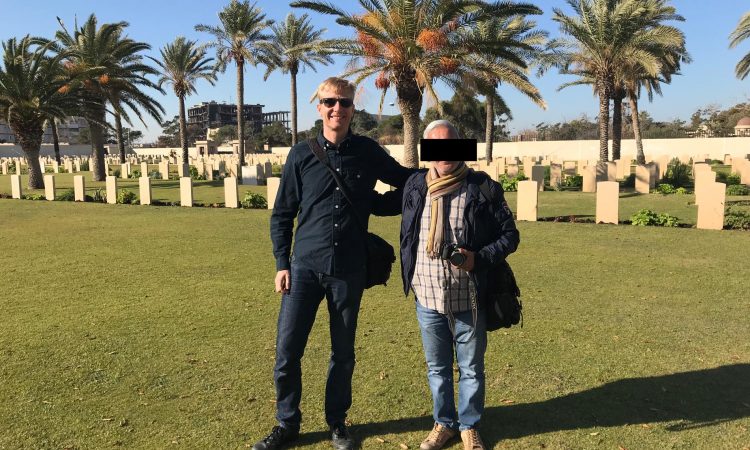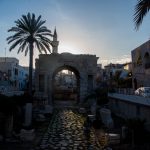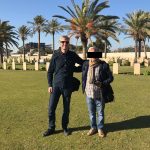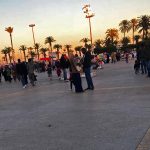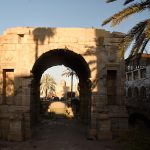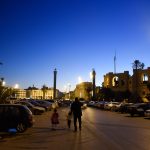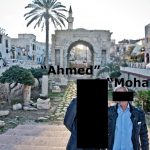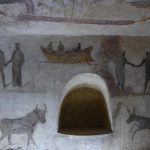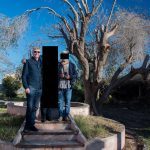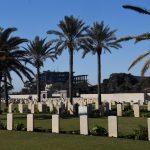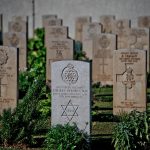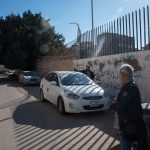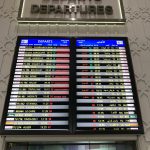“An even darker dungeon” – a true story from Libya..
The international airport in Tripoli has been closed since 2014. Instead I land in Tripolis Mitiga military airport. 12 days before I arrive Mitiga was attacked by rebel militia. At least 20 were killed  and at least 50 injured. Four planes were hit. The rest of the planes were flown to another airport to keep them safe. The airport was closed for a few days after that. When I land I am not aware of the most recent attack. I do know however that a few months back the airport was also closed after armed clashes within the airport area (and inside the actual airport).
and at least 50 injured. Four planes were hit. The rest of the planes were flown to another airport to keep them safe. The airport was closed for a few days after that. When I land I am not aware of the most recent attack. I do know however that a few months back the airport was also closed after armed clashes within the airport area (and inside the actual airport).
After I get my entry stamp I am stopped by a plainclothes guy who looks like he is fed up with his life. “Company. Telephone. Contact,” he says. It is the worst thing he can say. And about the only English words he knows. Mistakenly I have assumed that I can get by in French since I believe Libya used to be a French colony. But although Libya has been colonized by both the French, the Italian end the British – the French only made their way to the southern part of the country. In other words nobody here speaks a word of French. And these security guys also don’t speak English.
The Libyan tour operator I have booked through – let’s call them Libya tours – have specifically told me not to mention the name of their company and told me that I cannot have the phone numbers or the names of their contacts. So I am pretty much on my own. I take out my business invitation letter from the inviting company in Tripoli. The security officer looks like I have just handed him a piece of used toilet paper. “Contact” he just repeats. So I signal that we have to go outside the airport to meet my contact there. On the way out my bag is X-rayed and they find my big camera. This seems to finally convince the officers that I am clearly some evil journalist spy since in their opinion no such thing as a business traveler with a professional personal camera could possible exist. I am in trouble.
Outside the airport there is no one. We give up after five minutes of waiting and head back in. Just then Ahmed comes. Ahmed is not his real name but let’s call him that. Ahmed is my fixer but I don’t know that then. He speaks in Arabic to the security officer. Back in the immigration office they search my camera. There is no photos in it. Then they ask for the password for my PC. I don’t know what to do so I give it to them. The boss then checks all my folders and find my photos from Scotland, from Saudi, from everywhere. Then he finds a few of my travel articles in Word. Sweet. Now it seems like I am doomed. A little later Ahmed brings a brown envelope full of money to the table (about 200 dinars – around 80USD black market rate or 160 USD official rate I later find out). Unfortunately to no avail. They count the money, laugh at Ahmed, make fun of him and show him they have him recorded on a mobile phone and throw him out of the immigration office. I am alone. I am in big trouble.
Getting my visa to Libya prior to arrival had not been an easy task. First, I applied for a tourist visa in the Copenhagen Embassy. It was denied. I then found out about ‘Libya Tours’ on Facebook in the group Every Passport Stamp and got a business invitation from them. Again my visa was 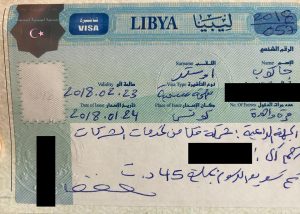 denied in Copenhagen. Probably because I had tried for a tourist visa initially. Instead I went to Tunis. I only had a week for the project including waiting time in Tunis or I would miss my next trip to the far east. Libya Tours wrote that one business day in Tunis was enough. I planned with two embassy working days regardless. A Tunis agent helped me. When I first got his name from Libya Tours I checked him on Facebook. The only person in Tunis with that name of course turned out to be an engineer who was posting religious muslim posts in Arabic all the time. Nice. However, I later found out that fortunately there were two people with the same name and my agent was a nice and distinguished gentleman. He helped me fill out the application form in Arabic in the embassy on the first day in the morning. When we came back in the afternoon the visa was not finished. “We need more time come back tomorrow” they said. Next day we were waiting for hours again. Finally, the embassy clerk emerged. My Libya visa was in my passport.
denied in Copenhagen. Probably because I had tried for a tourist visa initially. Instead I went to Tunis. I only had a week for the project including waiting time in Tunis or I would miss my next trip to the far east. Libya Tours wrote that one business day in Tunis was enough. I planned with two embassy working days regardless. A Tunis agent helped me. When I first got his name from Libya Tours I checked him on Facebook. The only person in Tunis with that name of course turned out to be an engineer who was posting religious muslim posts in Arabic all the time. Nice. However, I later found out that fortunately there were two people with the same name and my agent was a nice and distinguished gentleman. He helped me fill out the application form in Arabic in the embassy on the first day in the morning. When we came back in the afternoon the visa was not finished. “We need more time come back tomorrow” they said. Next day we were waiting for hours again. Finally, the embassy clerk emerged. My Libya visa was in my passport.
I wrote Libya tours that I had gotten my visa. “So far so good” they replied. And added. “Don’t bring your camera.”. Now bringing my camera is a rather large part of what I do. And I did not want to leave my big and expensive camera with some agent (however nice he was) in Tunis. So I simply wrote back that I would bring it and put it in my trolley. “Ok” Libya Tours (the boss) replied, and wrote that my fixer would be in the airport (on the outside) and “that they would also have somebody on the inside monitoring me”. Not to look too much like a tourist I left my Tunisia guidebook and my personal travel website business-cards at the hotel in Tunis.
Back at the immigration office I am still in trouble. Normally I can talk my way out of most situations. Here I cannot communicate at all. After about an hour of detainment the officers command me to come with them. We go from arrivals towards departures and I am 95% sure that now I will be deported. The plane I came in on is still waiting on the tarmac and will soon return to Tunis. Now it is pretty important for me to comply with the “24 hours in each country”-rule so being deported would a rather large setback to my project of visiting every country. Fortunately we just pass through departures and my passport is not given an exit stamp. They lead me to an office with a bed, a desk and three deep and soft sofas. It looks like half an office half a prison cell and I am wondering if they will let me sleep in here tonight. We then wait for another hour. And another. Nobody speaks to me. When I go to the toilet I am monitored.
Later I am told that an American person of Asian origin was previously also detained on arrival. The security police had then let him sit on a chair until 3 am in the morning with no other explanation than that ‘he could not be American when he looked like a Chinese’.
After 3 hours they ask me to move to a chair just outside the office. Sometimes they leave the door half closed. I have no internet but I am now able to send text messages without the officers seeing what I am doing. So I text my girlfriend and asks her to phone Henrik Jeppesen from Henrik Travel to get the number for a Danish television war reporter who I know has government contacts in Libya. I manage to get hold of his number and he texts me some very helpful info. Just as I am about to contact one of the numbers I have been given Ahmed however suddenly comes back with a big smile on his face. ‘Five minutes’ he signals. And five minutes later all the security officers are suddenly friendly to me (!?) and I am escorted back through the airport and released. After just over 4 hours of detainment I leave the Mitiga military airport of Tripoli as a free man.
In the afternoon we go sightseeing. Ahmed – my fixer – now also speaks English. He is a kind man who has a very stressful job. So is my guide – lets call him Mohamed. I have brought my big Nikon for the sightseeing – but I am too afraid to use it. We see the Martyrs Square, the old town and the 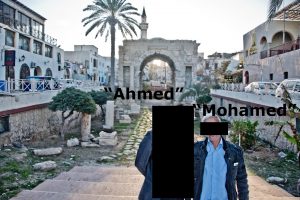 bazar where giraffes heads and leopard skins are openly on display. “When there is no law and order people will do whatever the hell they want” Mohamed tells me. He also tells me that one of his tourist groups once was held back by ISIL/Daesh (!!) for six hours out on the edge of town until they managed to pay themselves out of the situation (!?). They tell me not to photograph women or any men with long beards or any of the black market moneychangers that are everywhere.
bazar where giraffes heads and leopard skins are openly on display. “When there is no law and order people will do whatever the hell they want” Mohamed tells me. He also tells me that one of his tourist groups once was held back by ISIL/Daesh (!!) for six hours out on the edge of town until they managed to pay themselves out of the situation (!?). They tell me not to photograph women or any men with long beards or any of the black market moneychangers that are everywhere.
At a fish restaurant that night I get explained what happened earlier on and why I was released. I have no way to verify this story. If it has been made up it requires some pretty vivid imagination. Sit tight:
After the first hour of detainment the security police told Ahmed that they were deporting me and sending him to jail. They had Ahmeds name and telephone number and had recorded him on video. To go to jail in Libya you need your passport. Ahmed had rented a car to drive me around. His passport was kept with the rental agency. So Ahmed had to go back and collect his passport and come back to the airport to be thrown in jail. When Ahmed found his rental car at the airport it had already been seized by the security police. So Ahmed had to take a taxi to the rental agency to collect his passport. When he was in the taxi he rang everyone he knew to see if somebody could somehow save him from going to jail. The taxi driver overheard the conversation and asked if he could help. “My brother has a lot to say around the airport area” he said.
A little background info: I was told that there are two strong militias fighting for power in Tripoli. The UN backed government is allegedly seeking to make alliances with these two militias (even though many of their members formerly have been imprisoned) to form a government with a strong army. All other ‘rebel’ militias are being fought.
The brother of the taxi driver turns out to be warlord of the militia that controls Mitiga airport area. So Ahmed gets the warlord on the line and informs him of the situation and gives him my name and his own name. The warlord then calls the head of the foreign security police to find out who is in charge at the immigration at the airport and then calls the boss there. The warlord tells him that if he throws Ahmed to jail he will have the immigration boss thrown ‘in an even darker dungeon than the one he was about to throw Ahmed in’
(!!!)
Hehe – half an hour later the immigration boss calls Ahmed and tells him to return to the airport ‘in order for them to find a solution’. Ahmed comes back and all is sorted out.
”Tonight we must party” – Ahmed says. He says that now it is enough. That he is fed up going to the airport dealing with the security police. That today it was too close. (the same day I flew in 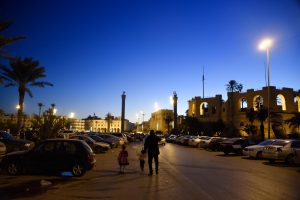 another guest of Libya Tours flew out the same morning which probably did not make Ahmed look any better so Ahmed was also – understandably – annoyed because of that since a ‘back to back’ guest operation like that increase his risk of problems in the airport).
another guest of Libya Tours flew out the same morning which probably did not make Ahmed look any better so Ahmed was also – understandably – annoyed because of that since a ‘back to back’ guest operation like that increase his risk of problems in the airport).
That night I cannot sleep. I usually do not get scared during day. I get scared during night when I am processing the events of the day. I keep getting up to write down new details for this story. At 1 am I am finally almost surrendering to sleep. Then they start firing outside. Maybe five minutes of machine gun fire coming from a street very near my hotel. The hotel has no security. Not a single guard. Fortunately – most likely – very, very few people will now that there I am here in room 204. Then all goes silent. Five minutes later they shoot again for a couple of minutes. People are running past the hotel shouting in the street. Never have I been so scared in all my life. Silence again. I listen and fear that I will hear people running in the corridors of the hotel. My heart beats loudly in the dark. I sleep only a few hours that night.
”Are you not used to that” Mohamed asks when I the next morning tell him about the shootings. “Don’t worry” he says. “They normally do not kidnap foreigners. We don’t have any suicide bombings either”. He pauses a bit before he adds: “Here we have only war”.
The next day the sightseeing continues. We drive 15 kilometers out of the centre to see some cave paintings. On the way we pass a bank in front of which hundreds of people are waiting in line. “It is because of the cash crisis,” Mohamed tells me. “All Gaddafis billions of dollars have vanished 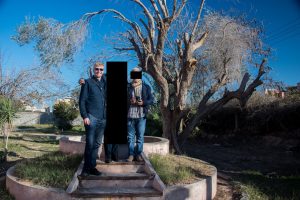 because of corruption. Now no one can get more than 200 Dinars out at a time. My wife is a teacher she earns 800 dinars a month so she has to go and stand in line four times a month” he tells me. “Sometimes people are beaten by the security police just for standing in the line” he adds.
because of corruption. Now no one can get more than 200 Dinars out at a time. My wife is a teacher she earns 800 dinars a month so she has to go and stand in line four times a month” he tells me. “Sometimes people are beaten by the security police just for standing in the line” he adds.
I am also told than under the Gaddafi regime no private companies were allowed. Paradoxically at the same time there was no public transport. No buses. No trains. Gaddafi died in 2011 but since then no public transport has been introduced. That means everyone has cars and traffic comes to a deadlock everywhere and constantly in Tripoli.
On the way back we pass Gadhafi’s former palace. Only rubbles are left at the huge grounds. It’s all shielded by high walls and I am not allowed to go in or photograph. “The refugees of the war live there now” Mohamed tells. “They live among the rubble and the garbage that everyone is throwing all over the place. It is like a dump in there”.
We also go and see the (British financed) WW2 War Cemetary. Muslim soldiers have their own sections. Christian and Jews are mixed. All the stones for the Jewish soldiers are shiny white. “They 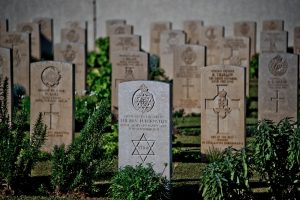 have been replaced after Daesh smashed every gravestone with a David star on them back in 2014” Mohamed tells me.
have been replaced after Daesh smashed every gravestone with a David star on them back in 2014” Mohamed tells me.
When I am about to leave in the early evening of my second day I am a bit worried. If rebels can attack the airport with anti-aircraft missiles why shouldn’t they be able to also attack the aircraft in flight? “Don’t worry” Mohamed tells me. “The rebels are in the hinterland – you will fly over the ocean – they cannot hit you there”.
Before going to the airport I spend some time reorganizing my photos and articles on my PC hiding them in secret folders. Again they find my Camera at the X-ray control. But this time it takes the immigration boss only a few seconds to let me clear. Maybe he is still thinking about that ‘even darker dungeon’.
On the plane out a Libyan guy next to me asks me all sorts of questions. Who am I working for. What was I doing in Libya. Suddenly and pretty much out of the blue he asks ”have you been to Saudi”. I have no idea why he is asking that. But just the day before my Saudi pictures seemed to be a problem. I stick to my company visit story and tell him I was in Saudi on combined business and pleasure. In the airport of Tunis I do everything possible to shake him or ny potential followers off.
As far as I have been informed after my visit Libya Tours have now stopped helping tourists enter Libya on business visas. I hope this is only temporary and I hope the security situation soon improves. If you are an EPS member and you do decide to try to go please bring only your mobile phone camera.
Thats it – all future posts should hopefully be a lot more peaceful. This story has taken no less than four continents to have done. Notes were written in Africa (trip took place a little over a week ago), story was written in Europe (Istanbul). Editing and translation from Danish was done in Asia (Bangkok and Bali) and it is now published in Oceania (Papua New Guinea). Thanks for staying on.

